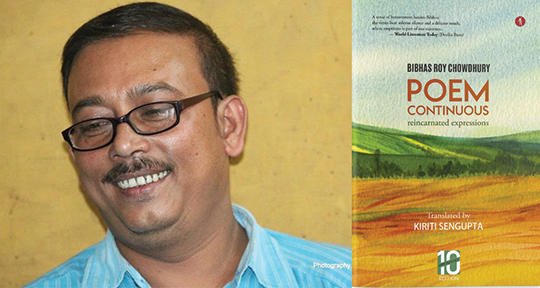Poem Continuous: Reincarnated Expressions by Bibhas Roy Chowdhury, translated from Bengali by Kiriti Sengupta, Hawakal Publishers, 2024
In The Anxiety of Influence, Harold Bloom writes: “Poetic Influence—when it involves two strong, authentic poets—always proceeds by a misreading of the prior poet, an act of creative correction that is actually and necessarily a misinterpretation.” According to Bloom’s theory, the authentic poet stands in relation to poets of the past, and this relationship to tradition is a creative force, which Bloom calls “misprision.” In the instance of Bibhas Roy Chowdhury’s Poem Continuous: Reincarnated Expressions, the traditional poet is Gurudev Rabindranath Tagore.
Both Roy Chowdhury and Tagore suffered from the Partition of Bengal by the British; in 1905, Tagore used Raksha Bandhan to unite Hindus and Muslims against the Partition, whereas Roy Chowdhury’s family lost their wealth, and upon the later division of Bangladesh in 1947, became refugees and common laborers. Throughout many of these poems, translated by Kiriti Sengupta, Roy Chowdhury laments this predicament, coalescing the historic developments with his father’s death. “True and False for My Father” reads:
I’ll say
(if I’m honest):
after my father’s demise
I found myself duty-bound
in the crematorium—
not from being his eldest son,
like an event manager, rather.I didn’t perform his last rites.
I followed no ritual
nor did I take part in the funeral.Someone remarked:
You are indeed
an ideal communist.

